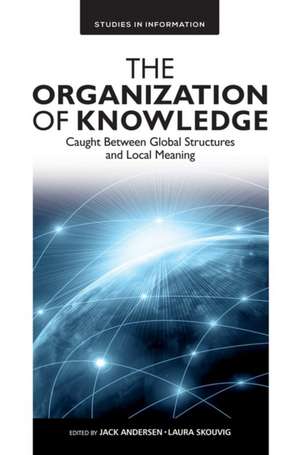The Organization of Knowledge – Caught Between Global Structures and Local Meaning: Studies in Information
Autor Jack Andersen, Laura Skouvigen Limba Engleză Hardback – 31 iul 2017
Preț: 779.63 lei
Preț vechi: 1012.49 lei
-23% Nou
Puncte Express: 1169
Preț estimativ în valută:
149.23€ • 162.15$ • 125.43£
149.23€ • 162.15$ • 125.43£
Carte tipărită la comandă
Livrare economică 21 aprilie-05 mai
Preluare comenzi: 021 569.72.76
Specificații
ISBN-13: 9781787145320
ISBN-10: 1787145328
Pagini: 128
Dimensiuni: 152 x 229 x 10 mm
Greutate: 0.28 kg
Editura: Emerald Publishing
Seria Studies in Information
ISBN-10: 1787145328
Pagini: 128
Dimensiuni: 152 x 229 x 10 mm
Greutate: 0.28 kg
Editura: Emerald Publishing
Seria Studies in Information
Notă biografică
Jack Andersen is an associate professor, PhD, at the Royal School of Library and Information Science, University Copenhagen. Andersen's research interests are centred on digital media, classification, and genre theory. Andersen has published several articles dealing with how to understand knowledge organization, scholarly literature, and information literacy from social theoretical, epistemological, and genre theoretical approaches. His recent edited volume, Genre Theory in Information Studies, explores different dimensions of genre in analyses of information. He is on the advisory board for the international research network, Genre Across Borders. In 2009-2013 Andersen served as vice-director and chair of department at the Royal School of Library and Information Science. He teaches courses on the theory of science, academic writing, media theory, and digital culture. Laura Skouvig is associate professor in Information Studies at the University of Copenhagen. Her primary research interest is the field of information history focusing on the history of the information age and information society. She has published articles on information networks, surveillance and communication of information primarily in the period of late 18th and early 19th century. Theoretically she works with inspiration from Michel Foucault and rhetorical genre theory. She's on the editorial boards of two international journals: library and information history and information and culture. She teaches courses on the theory of science and knowledge culture.
Cuprins
The organization of knowledge: caught between global structures and local meaning Genre, Organized Knowledge, and Communicative Action in Digital Culture Information cultures: shapes and shapings of information The (De-)Universalization of the United States: Inscribing Maori History in the Library of Congress Classification Reader-interest classifications: local classifications or global industry interest? Knowledge representation of photographic documents: a case study at the Federal University of Pernambuco (Brazil) Slanted knowledge organization as a new ethical perspective
Descriere
Through different theoretical and analyses glasses, this book critically examines the organization of knowledge as it is involved in matters of digital communication, the social, cultural, and political consequences of classifying, and how particular historical contexts shape ideas of information and what information to classify and record.



